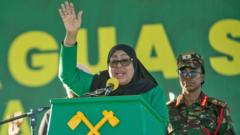Is Tanzania's First Female President Facing a Coronation, Not a Contest?

Published: 2025-10-27 19:00:29 | Category: world
The upcoming presidential election in Tanzania appears to be more of a coronation than a contest for President Samia Suluhu Hassan, as her main opposition has been sidelined. With the absence of heavyweight candidates, many citizens feel their vote lacks significance. Hassan, who became the first female president after the death of John Magufuli in 2021, has adopted reforms that initially seemed promising but have since been overshadowed by a crackdown on dissent and political freedoms.
Last updated: 24 October 2023 (BST)
What’s happening now
The political landscape in Tanzania is increasingly characterised by a lack of genuine competition as President Samia Suluhu Hassan gears up for her first election. With the main opposition party, Chadema, barred from participating and its leader facing treason charges, the election lacks the robust debate and vibrant campaigning typical of previous cycles. This has led to widespread disillusionment among voters, who perceive the electoral process as predetermined.
Key takeaways
- President Samia Suluhu Hassan is facing her first presidential election amidst claims of political repression.
- The main opposition party, Chadema, is effectively excluded from the race, diminishing electoral competitiveness.
- Hassan's government has faced criticism for increasing authoritarianism, including reports of abductions and targeted violence against dissenters.
Timeline: how we got here
The following timeline outlines significant events leading to the current political scenario in Tanzania:
- March 2021: Samia Suluhu Hassan becomes Tanzania's first female president following the death of John Magufuli.
- April 2021: Opposition leader Tundu Lissu is arrested, leading to calls for electoral reforms.
- October 2022: The electoral commission clears 17 candidates, but the main opposition is barred from participation.
- October 2023: The election is set to take place on Wednesday, with widespread public disillusionment reported.
What’s new vs what’s known
New today/this week
As the election date approaches, reports indicate a stark absence of major opposition candidates, leading many to view the election as a mere formality for President Hassan. The situation has grown increasingly dire for political dissenters, with reports of abductions and repression surfacing more frequently.
What was already established
Since taking office, President Hassan has initiated several reforms aimed at improving Tanzania's relations with international financial institutions. However, these efforts have been overshadowed by a growing climate of fear and repression against opposition voices.
Impact for the UK
Consumers and households
The political situation in Tanzania could have broader implications for UK businesses and investors interested in the region. A lack of stability and increasing authoritarianism may deter foreign investment, affecting economic opportunities for Tanzanians and potential trade relations with the UK.
Businesses and jobs
With the political environment becoming increasingly hostile, businesses may face challenges in navigating regulatory landscapes and maintaining operations amid potential civil unrest. The ongoing crackdown on dissent could impact sectors reliant on political stability.
Policy and regulation
In the lead-up to the election, the UK government may need to reassess its diplomatic and economic engagement with Tanzania, particularly in light of human rights concerns. Monitoring the outcome of the election will be crucial for understanding future relations.
Numbers that matter
- 37.7 million: The total number of registered voters in Tanzania.
- 17: The number of presidential candidates cleared by the electoral commission, excluding major opposition figures.
- 2: The number of years since President Hassan took office, during which political freedoms have reportedly diminished.
Definitions and jargon buster
- CCM: Chama Cha Mapinduzi, the ruling party in Tanzania since the reintroduction of multi-party democracy in 1992.
- Chadema: The main opposition party in Tanzania, currently facing legal challenges that bar its participation in the election.
- Mtandao: A term referring to a powerful network of business tycoons influencing political decisions within the ruling party.
How to think about the next steps
Near term (0–4 weeks)
The immediate aftermath of the election will be crucial in determining the future political landscape in Tanzania. Observers should look for reactions from local and international communities regarding the election's legitimacy.
Medium term (1–6 months)
As the political situation evolves, it will be important to monitor the government's responses to any dissent or protests following the election results. Continued scrutiny of human rights practices will be essential.
Signals to watch
- Voter turnout rates and public sentiment post-election.
- Responses from international bodies regarding the legitimacy of the election.
- Indicators of unrest or civil disobedience among the populace.
Practical guidance
Do
- Stay informed about the political landscape in Tanzania and its implications for business and human rights.
- Engage with reputable sources for updates on the election and its aftermath.
Don’t
- Avoid making assumptions about the election outcome without considering the broader political context.
- Disregard the potential consequences of the election on regional stability.
Checklist
- Review the implications of Tanzania's political climate for international investments.
- Monitor key indicators of civil society engagement and dissent.
- Assess risks associated with doing business in an increasingly authoritarian environment.
Risks, caveats, and uncertainties
The predominant uncertainty surrounding Tanzania's electoral process lies in the lack of credible opposition and the potential for violence or unrest in the aftermath of the election. Analysts caution that public dissatisfaction may lead to protests, which could be met with harsh government responses. Furthermore, the implications of President Hassan's alignment with influential business interests raise questions about her independence and commitment to reform.
Bottom line
The political climate in Tanzania ahead of the upcoming election indicates a troubling trend towards authoritarianism, with President Samia Suluhu Hassan facing significant challenges amid a lack of credible opposition. The implications for Tanzanian democracy and international relations are profound, necessitating close attention from both local and global observers.
FAQs
What is the significance of the upcoming election for President Samia Suluhu Hassan?
The upcoming election is significant for President Samia as it is her first since taking office, and many view it as a coronation rather than a competitive electoral process due to the absence of major opposition candidates.
How has the political environment changed since President Hassan took office?
Since taking office, the political environment has shifted towards increased repression, with reports of abductions and targeting of dissenters, contrasting with the initial hope for reforms.
What are the implications for Tanzanian citizens regarding the election?
The implications for Tanzanian citizens include a potential lack of representation and reduced political freedoms, leading to widespread disillusionment and apathy towards the electoral process.



